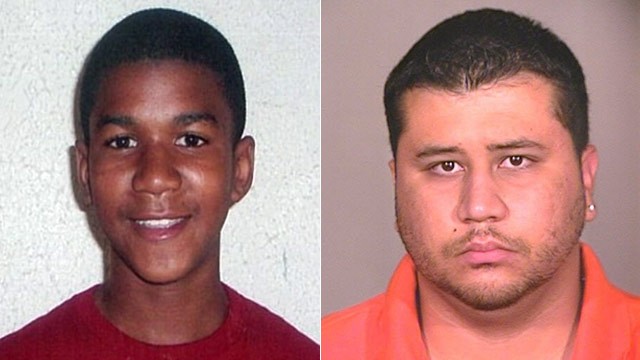
Trayvon Martin (left) and George Zimmerman (right)
“This guy looks like he’s up to no good … he looks black,” George Zimmerman told a police dispatcher on Feb. 26, 2011. Moments later he shot and killed an unarmed, 17-year-old.
Trayvon Martin is the latest fatality in the deadly, insidious disease of stereotyping young black males as “dangerous.”
“I will never look suspicious to you, even if I have a black hoodie, a pair of jeans and white sneakers,” wrote Michel Skolnik, who is white, in a commentary about the Trayvon Martin murder.
You are right Michel. White young men, no matter how many piercings, how baggy the pants are, tend to be seen as possibly mischievous or youthfully exuberant, but a threat? No. So what was Trayvon Martin’s crime?
In his final phone call to his girlfriend, according to Martin family attorney Benjamin Crump, Trayvon could be overheard asking Zimmerman, “Why are you following me?” Zimmerman could be heard replying, “What are you doing around here?”
So it seems Trayvon’s crime was existing.
The alarming degree of danger young black males are exposed to is, in part, attributable to a lack of common sense, the unrelenting depiction of young black males as criminals, and a legal system that marginalizes black life. Zimmerman has yet to be arrested.
As the mother of two black sons, I personally know the vulnerability and dark cloud of suspicion young black men experience regularly. Adolescents suspended from school more often than others, pulled over by the police more often, and viewed as guilty until proven innocent more often.
Most of us will never kill another human being when our feelings and prejudices escape our subconscious. All of us must examine, expose and dialogue about these stereotypes. We must come out of denial about the influence of stereotypes in our lives, examine our thoughts, check our feelings and be deliberate in our actions.
Trayvon Martin committed no crime. He was just a young black man who went to the store to pick up some Skittles and a drink and now he’s dead. The shooter is free. The public is talking. The investigators are investigating; but what will we learn? How do we protect our black male children in a society that marginalizes them?
Treating each other with respect, with the care and compassion we would want, or we would want our own children to receive, takes a consciousness of love and a refusal to let the lies, characterizations, and stereotypes win. Black young men are not by nature violent. It is our responsibility to take action to change ourselves and our society.
If life, liberty, and the pursuit of happiness do not apply to all of us, it does not apply to any of us.
